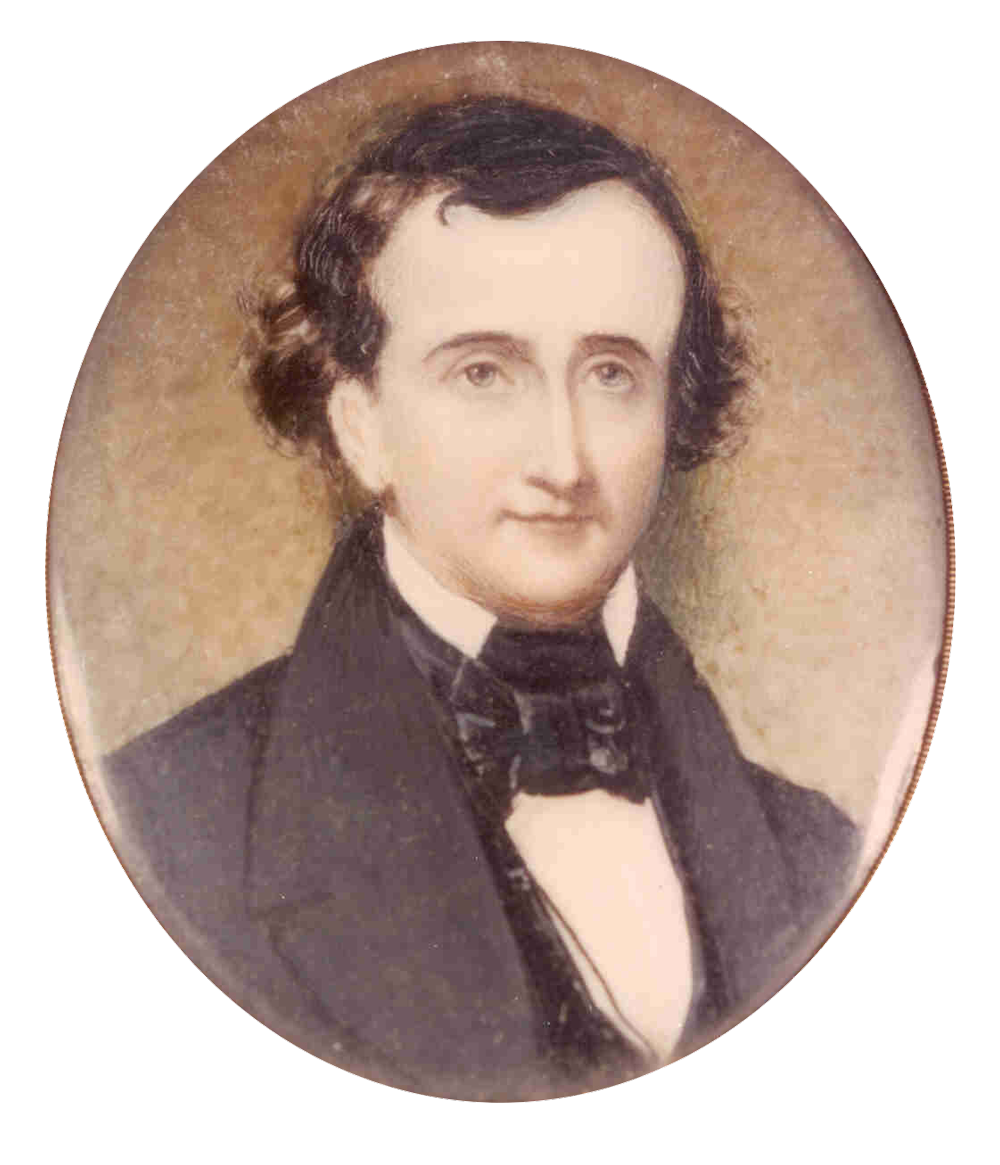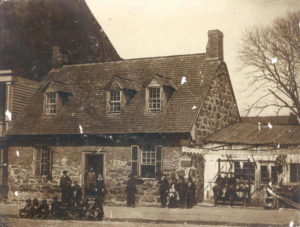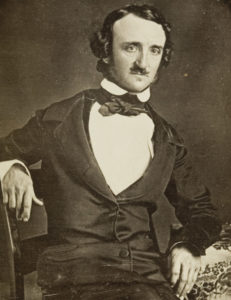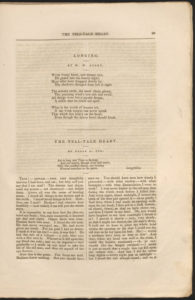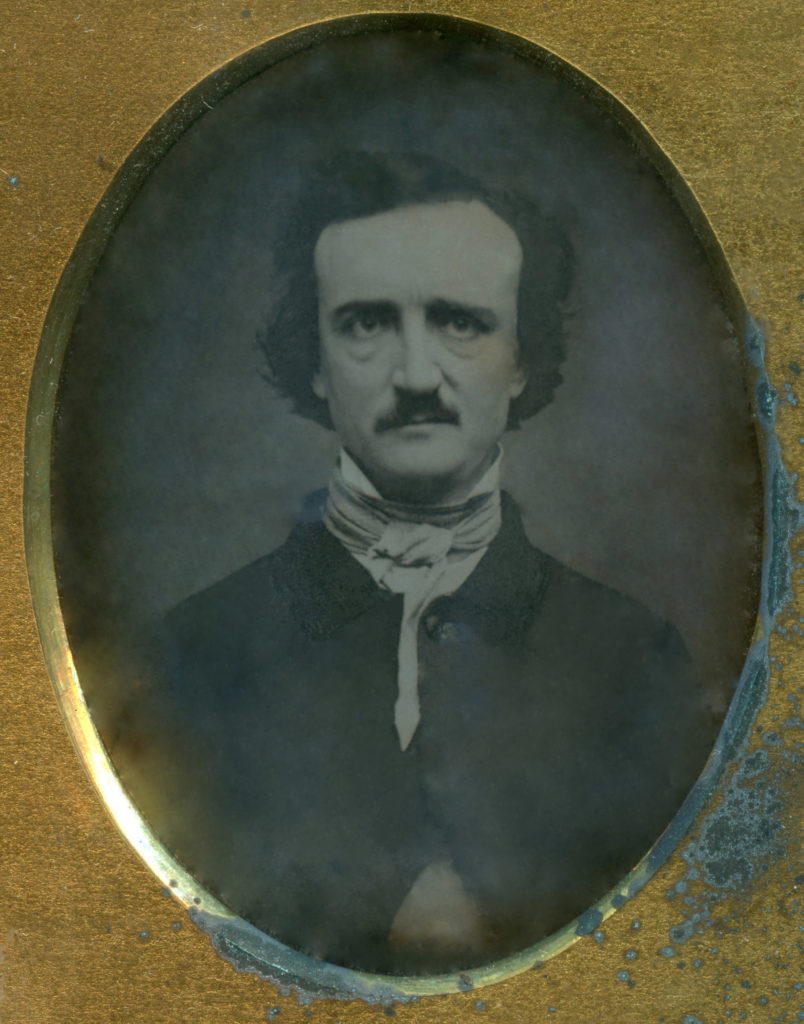Poe’s Early Life
Edgar Poe was born on January 19th, 1809 to traveling actors Eliza and David Poe. When Edgar was a baby, David abandoned the family, leaving Eliza to support three young children. In a devastating turn, Eliza contracted tuberculosis and spent the last few months of her life in Richmond. She died on December 8th, 1811 at the age of 24, leaving behind her three children. Two-year-old Edgar was taken in by Richmond couple John and Frances Allan. Edgar was never officially adopted, a cause and result of constant tensions between him and his foster father. He did not take their last name, but instead he became Edgar Allan Poe. As a teenager Poe enjoyed the life of the elite upper-class.
In 1824, a young Edgar Allan Poe was a part of a junior honor color guard that escorted the Revolutionary War General Marquis de Lafayette around Richmond, Virginia. Lafayette and the color guard stopped at Richmond’s Old Stone House to visit the Ege family, who had assisted in the American Revolution. Poe stood guard on the front steps of the house. 98 years later, the Old Stone House became the Poe Museum.
At the age of 17, Edgar traveled to Charlottesville to attend the University of Virginia (UVA). He left behind a fiancé, Elmira Royster, who promised to wait until after graduation to marry. Edgar almost immediately ran into trouble at UVA. Although he was a talented student, he had arrived at college with only $110 for tuition. UVA’s tuition was three times that, so he decided to gamble to raise the rest of the funds. Instead, Edgar generated $2,000 worth of debt. After just a couple months at UVA, he returned to Richmond disappointed and continued to feud with his foster father. To make matters worse, Elmira had become engaged to someone else. While Edgar was off at UVA, Elmira’s father had intercepted Edgar’s letters and steered her in the direction of another man who promised to be a successful businessman and a respectable citizen, something Edgar could not promise.
Poe then moved to Boston. He didn’t stay long, but during that time he published his first book of poetry “Tamerlane and Other Poems” under the pseudonym “A Bostonian.” When Poe was 18 he joined the army under the name “Edgar Perry.” Poe did exceptionally well in the army, rising to the rank of sergeant major in just two years. He then went to West Point, where once again he did well academically, but ran into financial issues. Poe was court marshalled for extreme dereliction of duty. He then moved to Baltimore.
In Baltimore Poe lived with several relatives, including his aunt Maria Clemm and her daughter, Virginia. Poe lived in Baltimore for four years, during which time he shifted from writing poetry to short stories. One publication that took special interest in him was the Southern Literary Messenger based in Richmond, Virginia. Poe published “Metzengerstein” which is considered his first horror story, and “Berenice” which was so graphic and terrifying that the magazine received multiple complaints from readers. Editor Thomas White offered Poe a job on the staff of the Messenger. Poe agreed and moved back to Richmond.
Poe’s Literary Career
Soon after Poe joined the Southern Literary Messenger, he and White began to have issues, the root of which perhaps came from Poe’s drinking. Poe invited his aunt and cousin, Maria and Virgina to live with him in Richmond. One year later, Poe and Virginia then got married. She was 13, he was 27. This is an unlikely pairing and there is much debate about the nature of their relationship. Poe often referred to Virginia as “sissy” (sister) and Maria as “Muddy” (mother). Although many people today presume their relationship was familial, we ultimately will never know what happened in their marriage behind closed doors. Virginia and Maria had a stabilizing effect on Poe. He seemed to be more responsible and happier during the years when they were with him.
In 1837 Poe left the Southern Literary Messenger and Richmond. Starting in 1838 while living in Philadelphia, he enjoyed his prime years of literature. Poe wrote “The Tell-Tale Heart,” the “Masque of the Red Death,” “The Black Cat,” “The Pit and the Pendulum,” “The Gold Bug,” “The Fall of the House of Usher,” “The Murders in the Rue Morgue,” and more.
“The Murders in the Rue Morgue” is particularly important because it was the first modern detective story. Poe was the first to write about an eccentric genius who solves mysterious crimes. Sir Arthur Conan Doyle cites Poe’s character, C. Auguste Dupin, as the literary inspiration behind his character, Sherlock Holmes. Poe was also an early pioneer of science fiction. Interestingly, the majority of his stories are comedies.
Poe wrote in many genres, but his contribution to horror is what makes him famous today. Poe revolutionized the genre. He was one of the first to involve deep, intuitive, psychological horror. He often wrote stories where the true monster was the capacity for evil that is inside each person, and what happens when that evil is acted upon.
Poe’s most famous piece is “The Raven.” Once published, in the early months of 1845, this poem made him an overnight success. Before the publication, Poe was well known in literary circles, but because of “The Raven” Edgar Allan Poe became a household name. Although Poe only made around $15 from the publication of “The Raven,” its international success created financial opportunities like taking on literary clients and giving lectures and recitations. Poe was the first American writer to live completely off of his earnings from writing. But for most of Poe’s adulthood, he struggled to financially support himself and his family.
Unfortunately, by this time, his wife Virginia began exhibiting symptoms of tuberculosis. She was sick for several years and died in 1847 while the couple lived in New York. Virginia was 24 years old when she died. Poe never emotionally recovered from the death of his wife. It was evident that he relied on her for mental and emotional support. Poe began to drift back south towards the city of his childhood: Richmond.
The Death of Edgar Allan Poe
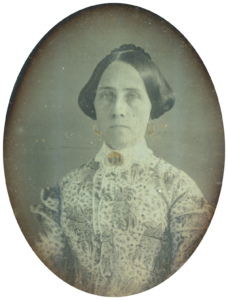
While in Richmond, Poe rekindled his childhood romance with Elmira Royster Shelton, who was then a wealthy widow. At the dismay of her children, she and Poe once again became engaged in 1849. Poe planned to move permanently to Richmond to be with Elmira. He planned a trip to New York to bring Maria (his mother-in-law) back to Richmond. He was also planning to see a client in Philadelphia on the way up the coast.
Poe’s last day in Richmond was on September 26th, 1849. Elmira was worried about his health. After his bout of cholera, his health had been quite fragile. She encouraged Poe to visit his doctor who is also a friend. Poe did, but it was primarily a social visit. He had a late meal at Sadler’s Restaurant. And at 4am on September 27th, 1849, Poe boarded a ship headed for Baltimore. From September 27th until October 3rd, there is no record of his whereabouts.
On October 3rd, an election day, Poe was found delirious in a tavern called Gunner’s Hall in Baltimore. He appeared drunk, wearing someone else’s clothes and was taken to Washington University Hospital. For the next four days he was in and out of consciousness, sometimes being alert, sometimes screaming at nothing and no one.
Edgar Allan Poe died on October 7th, 1849. The doctor labeled his cause of death as “phrenitis” (inflammation of the brain) which was commonly used when the true cause of death was unknown. Because of these mysterious circumstances, and the persona of Poe, there is much speculation about the true manner of his death. There are over 26 published theories on his demise, so far.
Poe’s death, although untimely and unfortunate, was quite the fitting end for a writer who created stories of true horror and mystery. Even in death, Edgar Allan Poe created a mystery that would live on forever.

